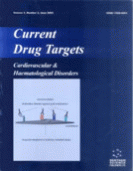Abstract
Hydroxymethyl-glutaryl coenzyme A reductase inhibitors (statins) offer important benefits for the large populations of individuals at high risk for coronary heart and cerebrovascular disease. the overall clinical benefits observed with statin therapy appear to be greater than what might be expected from changes in lipid profile alone, suggesting that the beneficial effects of such drugs may extend beyond their effects on serum cholesterol. Platelet hyperactivity is a key step in atherothrombosis and experimental data suggest that statins could exert an antiplatelet effect which could be involved in their protective action. In the present review we report of the major studies in humans showing the effect of statins on platelets, especially by the more sensitive methods to explore platelet function such as cytofluorymetric detection of specific proteins. Moreover we describe the putative mechanisms involved in platelet deactivation with particular regard to the effects related to cholesterol reduction or beyond lipid-lowering. Indeed, data from several studies suggest some differences among compounds in terms of timing of action by modulation of several activating pathways which could take part either in the early, cholesterol-lowering independent, effects in the acute phase of vascular disease or during chronic treatment.
Keywords: statins, platelets, lipids, pleiotropic effects, atherothrombosis
 4
4











